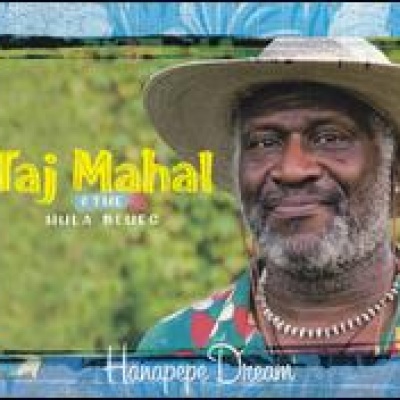
Hanapepe Dream
by Thom JurekRecorded in the year 2000 in Bremen and in Hawaii, Hanapepe Dream is ethnomusicologist, guitarist, and composer Taj Mahal's own gumbo of Caribbean, Polynesian, African, and American folk roots styles done up in the glorious dress of "song," for anyone who has ears to hear, feet to shuffle, and an ass to shake. Featuring a large band replete with three ukuleles (little, baritone, and tenor), Hawaiian steel guitars, slack key guitars, horns, steel drums, and standard bass, drums, and guitars, Mahal reveals why he's a master of combining traditions and musics from different histories and regions. In fact, Mahal can prove, via his very fine performance here, that all forms of soul and blues, reggae, jazz, and rock & roll music come from one source and that source lies in the African Diaspora. Mahal's own songs here are fine offerings: There's "Great Big Boat," the opener full of celebratory drums and choral singing and loping winds and horns, and "Baby You're My Destiny," a slippery swing tune that borders on Hawaiian folk music and could have been recorded by Django Reinhardt with Louis Prima, Gabby Pahinui, and Ike Quebec sitting in. But it is in the traditional folk tunes such as "Blackjack Davey," "King Edward's Throne," and the most unique and gorgeous reading of "Stagger Lee" ever that Mahal pulls out the stops and showcases his entire vision. The latter song becomes an expression of how community embraces story, movement, tragedy, celebration, and shared space and time. They come roiling from different musical approximations -- not appropriations -- as Mahal doesn't steal anything here; he offers the ancient sources of this music up as easily identified if not easily separated, and engages the song itself as the easiest and most memorable form of communication we have as human beings. Mahal offers further proof by using Bob Dylan's "All Along the Watchtower" and Richie Havens' "African Herbman" as current examples of cross miscegenation of course material. In the Dylan song, jazz entwines reggae and calypso as well as Hawaiian slack key, and the Havens track moves through the Nigerian and Malian folk legacies and brings them to the Caribbean for articulation. Any way you hear it, Hanapepe Dream is further evidence that Mahal has been on a hot streak these past six years, and it continues here with a vengeance.
